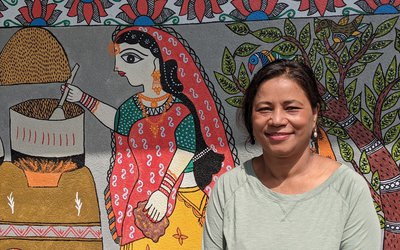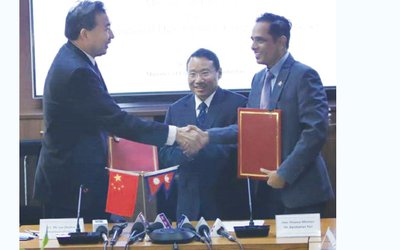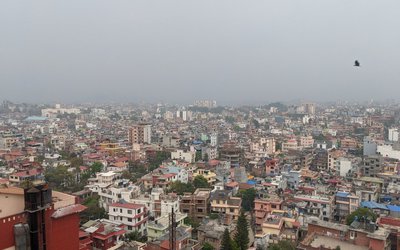Former Home secretary Chandi Prasad Shrestha is a well known name in Nepal’s bureaucracy. Shrestha, chairman of JICA Alumni Association Forum of SAARC countries (JAAFSC) and immediate past president of JICA Alumni Association of Nepal (JAAN), is now president elect of Rotary Club Lalitpur mid-town. Having worked in disaster management during his tenure as Home secretary, Shrestha spoke to New Spotlight on various issues. Excerpts:
As a former home secretary and now member of one of the active social organizations like Rotary, how do you look at the level of preparedness for earthquakes in Kathmandu valley?
Along with the government, organizations like NSET have done a commendable job. During my tenure as a secretary of Home affairs, I had the opportunity to work with them. I really appreciate the dedication and commitment of NSET team. We need to boast about their good work. So far as other civil society organizations are concerned, I have not seen much in their working focused on earthquake. Of course, Nepal Red Cross Society, international non-governmental organizations and other local non-governmental organizations have been working in the area of disaster. We have to accept the fact that NSET is just for earthquake.
How about organizations like the Rotary International?
We are yet to start programs on earthquake preparedness and other such disasters. Rotary is now focusing on polio, education, drinking water, income generation and other service sector. Even my own club has never thought about earthquake disaster. We organize programs like blood donations and other such programs.
Since JICA has provided a lot of support during earthquakes, what about the role of JAAN?
During my tenure as the president of JAAN, we organized some programs with the NSET about the need to promote earthquake safety in Nepal. One of our members and former secretary engineer, Barun Prasad Shrestha, who is also member of NSET, helped to bring JAAN and NSET together.
How do you see the level of preparedness in general?
Frankly speaking, our level of preparedness is very low compared to the threat and risk of earthquake in the Kathmandu valley. I am also not satisfied with the role of organizations I have seen involved in the areas of earthquake risk reduction. Of course, problems in the areas like health, education, water and sanitation are much higher but we also need to give some attention to earthquakes and natural disasters.
As a former home secretary, how do you see the role of civilian authorities in managing disasters like earthquake?
The role of civilian authorities is important. The Ministry of Home at the center and Chief District Officer at the district level are the main civilian authorities to coordinate the works during the disaster. Similarly, officials at the District Development Committee, Municipalities and Village Development Committees up to ward level play a crucial role during disasters. Of course, security related agencies have the most important role in the rescue operation as they all are frontline agencies. It is security agency which set up the command post to launch effective relief and rescue operation but it is the civilian authority which is responsible for the management of command post. There is the need to create an awareness level from the grassroots about these works.
I see there is the need to start preparedness from the grassroots level. It is unfortunate that we have hardly done any drill in our area. As the risk of a major earthquake is there in Kathmandu Valley, we need to do some kind of a drill at least twice a year. I think this must start from the citizens level. Due to regular drills, Japanese citizens are really prepared.
How do you see the economic impacts of the quake?
We have hardly looked at them. Frankly speaking, it will have a devastating impact. For instance, a modern apartment in the valley reportedly cracked during the last September earthquake. Constructed just a couple of years ago with the estimation to face certain level of earthquake, the crack in that apartment building has already created a panicky situation among many people. Many others might have a similar fate. The last earthquake was just a wake up call. If the epicenter was closer, most of the houses would have collapsed in the valley. The economic impact will be unimaginable in case of a major earthquake in the valley. We need to take this possibility into account. Study reports have already suggested that more than 60 percent of the houses will be destroyed or partially destroyed. Frankly speaking, we are yet to give priority to earthquake.
How do you see the level of awareness regarding the quake?
The level of awareness has gone tremendously high. My concern is whether this awareness level is enough given the projected level of destruction by the earthquake. People are much concerned now about earthquake safety and taking some initiatives also. We know many bridges will collapse in the valley and it will disrupt the whole process of rescue work. We have to see the level preparedness at the hospitals. It is very sad that there is no open space. Most open space is encroached by various groups.
What is your impression about the preparedness taken by the other sectors?
Other sectors have also their own preparedness. In telecom sector, for instance, NCELL has a backup system in a couple of places out of Kathmandu and within Kathmandu. NCELL has backup system in Hetauda. There are regional centers in Biratnagar, Pokhara and Bhairahawa. If quake hits one center, others will back up. Similarly, many banks have already set up data back-up centers in one or two places in different destinations like in Biratnagar. This is a good beginning. We cannot stop the economic damage made by earthquake.
- TANAHU HYDROPOWER PROEJCT: A Significant Achievement
- Apr 15, 2024
- AMBASSADOR HANAN GODAR: Sharing Pain With A Nepali Family
- Mar 30, 2024
- VISIT OF KfW AND EIB TO NEPAL : Mission Matters
- Mar 25, 2024
- NEPAL BRITAIN SOCIETY: Pratima Pande's Leadership
- Mar 24, 2024
- NEPAL ARMY DAY: Time To Recall Glory
- Mar 15, 2024
















